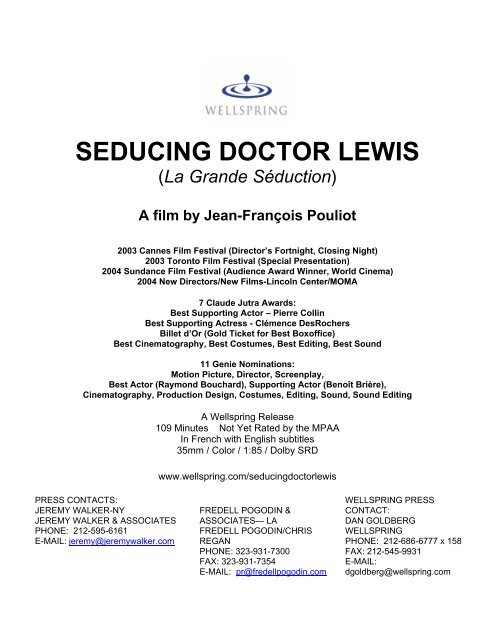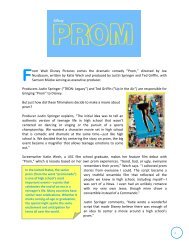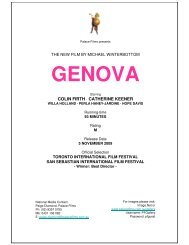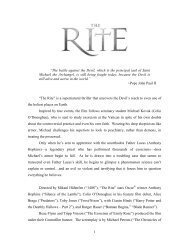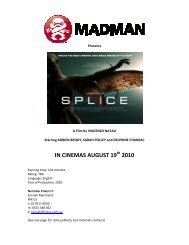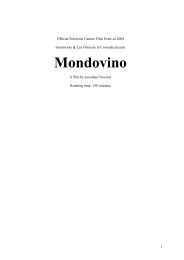SEDUCING DOCTOR LEWIS - Parent Directory
SEDUCING DOCTOR LEWIS - Parent Directory
SEDUCING DOCTOR LEWIS - Parent Directory
You also want an ePaper? Increase the reach of your titles
YUMPU automatically turns print PDFs into web optimized ePapers that Google loves.
<strong>SEDUCING</strong> <strong>DOCTOR</strong> <strong>LEWIS</strong><br />
(La Grande Séduction)<br />
A film by Jean-François Pouliot<br />
2003 Cannes Film Festival (Director’s Fortnight, Closing Night)<br />
2003 Toronto Film Festival (Special Presentation)<br />
2004 Sundance Film Festival (Audience Award Winner, World Cinema)<br />
2004 New Directors/New Films-Lincoln Center/MOMA<br />
7 Claude Jutra Awards:<br />
Best Supporting Actor – Pierre Collin<br />
Best Supporting Actress - Clémence DesRochers<br />
Billet d’Or (Gold Ticket for Best Boxoffice)<br />
Best Cinematography, Best Costumes, Best Editing, Best Sound<br />
11 Genie Nominations:<br />
Motion Picture, Director, Screenplay,<br />
Best Actor (Raymond Bouchard), Supporting Actor (Benoît Brière),<br />
Cinematography, Production Design, Costumes, Editing, Sound, Sound Editing<br />
PRESS CONTACTS:<br />
JEREMY WALKER-NY<br />
JEREMY WALKER & ASSOCIATES<br />
PHONE: 212-595-6161<br />
E-MAIL: jeremy@jeremywalker.com<br />
A Wellspring Release<br />
109 Minutes Not Yet Rated by the MPAA<br />
In French with English subtitles<br />
35mm / Color / 1:85 / Dolby SRD<br />
www.wellspring.com/seducingdoctorlewis<br />
FREDELL POGODIN &<br />
ASSOCIATES— LA<br />
FREDELL POGODIN/CHRIS<br />
REGAN<br />
PHONE: 323-931-7300<br />
FAX: 323-931-7354<br />
E-MAIL: pr@fredellpogodin.com<br />
WELLSPRING PRESS<br />
CONTACT:<br />
DAN GOLDBERG<br />
WELLSPRING<br />
PHONE: 212-686-6777 x 158<br />
FAX: 212-545-9931<br />
E-MAIL:<br />
dgoldberg@wellspring.com
<strong>SEDUCING</strong> <strong>DOCTOR</strong> <strong>LEWIS</strong><br />
Cast<br />
Germain Lesage RAYMOND BOUCHARD<br />
Christopher Lewis DAVID BOUTIN<br />
Henri Giroux BENOÎT BRIÈRE<br />
Yvon Brunet PIERRE COLLIN<br />
Ève Beauchemin LUCIE LAURIER<br />
Steve Laurin BRUNO BLANCHET<br />
Hélène Lesage RITA LAFONTAINE<br />
Clothilde Brunet CLÉMENCE DesROCHERS<br />
Monsieur Dupré DONALD PILON<br />
Mayor Réal JEAN-PIERRE GONTHIER<br />
Richard Auger KEN SCOTT<br />
Sylvie Auger MARIE-FRANCE LAMBERT<br />
Filmmakers<br />
Director JEAN-FRANÇOIS POULIOT<br />
Screenplay KEN SCOTT<br />
Producers ROGER FRAPPIER<br />
LUC VANDAL<br />
Director of Photography ALLEN SMITH<br />
Production Designer NORMAND SARRAZIN<br />
MusicJEAN-MARIE BENOÎT<br />
Costumes LOUISE GAGNÉ<br />
Editor DOMINIQUE FORTIN<br />
Sound Recording CLAUDE HAZANAVICIUS<br />
Sound Designer MARCEL POTHIER<br />
Sound Mix MICHEL DESCOMBES<br />
RÉJEAN JUTEAU<br />
Casting LUCIE ROBITAILLE<br />
Make-Up NADINE GILLIOT<br />
Hair GAÉTAN LANDRY<br />
Production Manager SYLVIE DE GRANDPRÉ<br />
Assistant Director MIREILLE GOULET<br />
Continuity MONIQUE GERVAIS<br />
2
<strong>SEDUCING</strong> <strong>DOCTOR</strong> <strong>LEWIS</strong><br />
Synopsis<br />
“The best way to kill a man is to pay him for not working.”<br />
—Félix Leclerc, French-Canadian singer-songwriter<br />
The sleep of Germain (Raymond Bouchard), a retired fisherman, is interrupted by<br />
memories of his boyhood on the small northern Quebec island of Ste. Marie-La<br />
Mauderne. This was a town where the men put in honest days of work scouring<br />
their local harbor for the fish that would feed an entire nation. While they weren’t<br />
rich, these men had the proud glow of wage earners supporting their families and<br />
their community.<br />
But lately, with its stockpile of fish depleted—Ste. Marie-La Mauderne is wasting<br />
away. Germain and the other fishermen have to rely on government welfare and<br />
many families are moving. No one is happy taking handouts—they want to work.<br />
On welfare day, the fisherman take the sad walk down the docks to the post<br />
office, where they pick up their relief checks from Ève (Lucie Laurier), the clerk:<br />
Germain, who has worked out a way to get an extra check, his scruffy best friend<br />
Yvon (Pierre Collin), even the Mayor, Réal (Jean-Pierre Gonthier). Next they<br />
traipse over to the bank, where Henri (Benoît Brière), the high-strung bank<br />
manager, cashes their checks.<br />
But there is some hope. A company is considering building a factory on the<br />
island. However, the investor’s insurer requires a resident doctor. This could be<br />
a deal-breaker as Sainte-Marie-La Mauderne has been trying for over fifteen<br />
years to lure a doctor.<br />
That night, Germain finds out his wife Hélène (Rita Lafontaine) has been offered<br />
a job in the city by her brother. She plans to take it unless things change. Later<br />
on, Germain catches the Mayor sneaking out of town—he’s taken a job with the<br />
Provincial Police. It’s clear that it’s time to take some action.<br />
The next morning, Germain breaks into the village school and creates a crude<br />
brochure, which he photocopies. Steve (Bruno Blanchet) uses the computer to<br />
get him a list of all the doctors in Quebec and Yvon and Henri help him send out<br />
the query letters. Unfortunately, there are no takers.<br />
A change in the town’s luck comes when a Montreal plastic surgeon, Christopher<br />
Lewis (David Boutin), high on cocaine, is pulled over for speeding. The<br />
policeman turns out to be Réal, the ex-Mayor. A deal is soon worked out that<br />
Lewis will practice in the town for a month in exchange for the charges being<br />
dropped.<br />
3
Germain, the new Mayor, calls the city together for a meeting. Everyone must<br />
work together to persuade Dr. Lewis to fall in love with Sainte-Marie-La<br />
Mauderne and stay. The seduction has begun!<br />
Germain and his friends devise a host of strategies to make Lewis feel at home,<br />
including a town clean-up and leaving money for the doctor to accidentally<br />
“discover.” The most elaborate involves getting the town to play cricket, a sport<br />
Lewis adores.<br />
In fact, when Dr. Lewis finally arrives, a “cricket match” is in progress. Somehow<br />
the villagers—who are clueless about the sport—are able to convince him they<br />
know what they’re doing. Germain takes Lewis to Henri’s place, his temporary<br />
home. When he calls his girlfriend and tells her he misses her beef stroganoff,<br />
the townspeople—who are tapping his phone—quickly make arrangements to<br />
get the dish on the menu at the town’s sole restaurant. Getting lost on the way to<br />
the restaurant, he offends the attractive postal clerk Ève by referring to the town<br />
as “microscopic.”<br />
The next day, Dr. Lewis is besieged with an endless line of patients afflicted with<br />
strange maladies unknown in the big city. Enraged, Germain calls another town<br />
meeting, and determines that he will set the doctor’s schedule in the future.<br />
Germain phones the industrialist, Monsieur Dupré (Donald Pilon), and tells him<br />
about Dr. Lewis. Dupré tells him that another town has made a better offer for<br />
the factory. If Sainte-Marie-La Mauderne really wants it, they will have to come<br />
up with $50,000.<br />
The next morning, Dr. Lewis gets up and sees only one patient waiting at his<br />
door. Germain and Yvon meet with Henri at the bank. While wary of loaning<br />
them money for a “bribe,” he agrees to fill out the loan papers. Later, Hélène<br />
reluctantly tells Germain that she has found out Dr. Lewis never had a father.<br />
Germain promises that he will never make use of this, but later, when he is out<br />
fishing with Lewis, he sadly mentions that he lost a son Lewis’ age.<br />
Dr. Lewis is a hopeless fisherman, but he is determined that he will catch<br />
something before he leaves Ste. Marie-La Mauderne.<br />
Tapping Dr. Lewis’ phone every day, Hélène and Yvon’s wife Clothilde<br />
(Clémence DesRochers) overhear him sharing some passionate moments with<br />
his girlfriend Brigitte, including his desire to massage her feet. When the word<br />
gets around that Dr. Lewis likes feet, Germain gets the local women to choose<br />
suitable footware. Lewis only seems interested in Ève, but she reminds him that<br />
he is spoken for.<br />
4
The next time Germain goes out fishing with Dr. Lewis, Yvon scuba dives<br />
underneath their boat and attaches a fish from his freezer to the doctor’s hook.<br />
Dr. Lewis is jubilant to catch his first fish, but does notice that the fish is frozen<br />
solid. Germain explains that it must have come from the “very bottom.”<br />
Dr. Lewis’ time away from his girlfriend, Brigitt, seems to be cooling down their<br />
relationship. She doesn’t respond when he tells her about the barbarities local<br />
people face without a local doctor—phony stories stage-managered by Germain.<br />
Dr. Lewis calls his friend Paul and asks him to look after Brigitte while he’s away.<br />
Henri gives Germain and Yvon the bad news—the bank has turned down their<br />
application. They sternly advise him to try again.<br />
Dupré calls Germain with an additional hitch: the town cannot get a factory<br />
unless its population is over 200, but governmental records say that only 125<br />
people live there. When Dupré arrives in town, Germain comes up with an<br />
ingenious plan to prove him otherwise.<br />
The next morning, Yvon and Henri are in a celebratory mood, but Germain<br />
explains to them that if they were to ask Dr. Lewis to stay, he wouldn’t accept.<br />
“The fish took the bait, we set the hook,” says Germain. “But now comes the<br />
hard part. We have to slowly reel in the fish.”<br />
Germain convinces Bertrand, the food deliveryman, who he has arranged to be<br />
waylaid on the island, to play the role of “Dr. Pitt,” a physician willing to sign on<br />
for five years. Dr. Lewis watches sadly from the sidelines as the town’s attention<br />
turns away from him.<br />
Henri makes a desperate plea to his superior at the bank to approve the loan, but<br />
when he is rebuffed, he approves it himself. He brings Germain and Yvon<br />
$55,000, including $5000 to buy his land. “I’m going to need a new job soon,” he<br />
says.<br />
Dr. Lewis makes a terrible discovery—his girlfriend Brigitte has been cheating on<br />
him for three years with this best friend Paul. “How could I not have seen how<br />
everything around me was fake?” says Lewis. His words sting Germain.<br />
While all the elements of Germain’s grand plan seem to have come together,<br />
there is now one unexpected question: how will Christopher Lewis feel after he<br />
signs—and then learns that the town has tricked him?<br />
* * *<br />
5
<strong>SEDUCING</strong> <strong>DOCTOR</strong> <strong>LEWIS</strong><br />
About the Production<br />
When Jean-François Pouliot was first approached with Ken Scott’s screenplay<br />
for Seducing Doctor Lewis, he had long since given up on the idea of ever<br />
directing a feature film. As a successful commercial director in Montreal, he had<br />
been approached with numerous projects over the last fifteen years, but nothing<br />
had attracted his interest. “I always had this belief that one had to fall in love with<br />
a script,” says Pouliot. Also, the timing couldn’t have been worse. Pouliot had<br />
just raised the financing for a software firm called Eloda he was about to launch.<br />
“In the past I’ve had the habit of reading scripts that were proposed to me many<br />
times and sending them back with pages of notes,” says Pouliot. “But in this<br />
case, I read it once very quickly. I went back to the producer, Roger Frappier,<br />
and said, ‘I will not read this a second time unless you tell me it’s mine.’ It was<br />
one of the most well-written, well-crafted scripts I had ever read.” Pouliot<br />
secured permission from his shareholders to put his company temporarily on<br />
hold, and signed on to make his feature directorial debut with the film.<br />
Pouliot had been recommended to Scott and Frappier by actor Benoît Brière<br />
(who plays Henri in the film), who had teamed with Pouliot on a long-running<br />
series of ads for Bell Canada. “He said, ‘I’ve been working with this guy for 12<br />
years and when I hear your version of comedy, I have the feeling I’m listening to<br />
him.’”<br />
“For me, comedy is another way of treating drama,” says Pouliot. “There’s no<br />
such thing as pure comedy that doesn’t rely on drama. And in this case, it<br />
seemed evident that none of the characters in the film knew that what they were<br />
doing was funny. Deep down the story of Seducing Doctor Lewis is a tragic one:<br />
it’s about people who have lost their dignity—and are willing to do anything to<br />
6
egain it. And this was what Ken and Roger were looking for: someone who<br />
would deal with comedy in a very delicate way.”<br />
Pouliot began working with Ken Scott by having him read the entire script to him.<br />
Over an entire day, the writer told the director what his intentions were in each<br />
scene. The following day, Pouliot had his turn. “I never challenged the intentions<br />
of the scenes,” says Pouliot. “I would only suggest if I thought there were better<br />
ways to achieve his intentions.” Ultimately, Scott and Pouliot put the entire script<br />
up on four walls of the office and color-coded it to track the shifts in tone and to<br />
see what was absolutely essential, and what could be lost if there were budget<br />
problems. “It was a very close, productive relationship,” says Pouliot.<br />
Many people have felt that the script is influenced by British films like Local Hero<br />
and Waking Ned Devine (which Pouliot only saw after finishing the film).<br />
“Actually, my major influence is French playwright and film director Marcel<br />
Pagnol (Marius, Fanny, César),” says Pouliot. “I wanted the characters to have<br />
that kind of flavor. I guess the difference is that in his stories there is always sun,<br />
where in Seducing Doctor Lewis it’s under a cloudy sky, so that probably gave it<br />
a more northern mood.”<br />
Many of the stories of this nature are constructed like “fish out of water” stories,<br />
but Seducing Doctor Lewis is more “water out of fish.” “The doctor is the little<br />
stone that comes in and generates the story,” says Pouliot. “But he’s not the<br />
main character and neither is Germain. The village is the main character. And<br />
that’s why it was crucial to find the right location.”<br />
The filmmakers ultimately found their Ste-Marie-La Mauderne in Harrington<br />
Harbour, a remote northern Quebec island with a population of 300. Originally<br />
they had rejected the site as being too impractical, but after months of<br />
unsuccessful scouting, they decided to at least have a look. “And here was<br />
where the producers were courageous,” says Pouliot. “They said, ‘We can’t<br />
7
afford not to shoot here.’ We knew that if we didn’t shoot in this place—it<br />
wouldn’t be the same film.” Shooting in Harrington Harbour added at least half a<br />
million dollars to the budget as well as all kinds of intangible risks. “Once you’re<br />
there, you know that every time you bring an actor in it’s four and a half hours of<br />
flying on a private plane, and then a boat ride to the island, hoping that the sea<br />
will not be too bad,” says Pouliot. “And on an island like that, in one day you<br />
have all the climates—rain, snow, sunshine, fog, everything.” One scene,<br />
involving Dr. Lewis (David Boutin) and Ève (Lucie Laurier) was shot through rain,<br />
hurricane winds and sunshine—and yet through the efforts of Pouliot,<br />
cinematographer Allen Smith and his crew, they were able to create the illusion<br />
of continuity.<br />
“One thing that helped me was being an advertising film director for fifteen<br />
years,” says Pouliot. “I’ve probably shot more feature films—in length—than<br />
many experienced directors. So I didn’t have the feeling of going through<br />
something for the first time. And I was confident that I’d have enough tricks in my<br />
toolbox to make it happen.”<br />
Harrington Harbour, unlike the island in the film, is quite prosperous. “The village<br />
looked a little too good,” says Pouliot. “We had to treat the houses and make<br />
them look a bit more rundown. But all of the boardwalks are just as you see<br />
them in the film.” Production designer Normand Sarrazin also built an exterior of<br />
a restaurant, as the actual one on the island was not in the center of town.<br />
Pouliot cast popular Quebec actor Raymond Bouchard as Ste-Marie-La<br />
Mauderne’s mayor, Germain Lesage. “I knew that this character would be lying<br />
through the entire film,” says Pouliot. “I had to find someone that you would<br />
accept anything from. He had to be a true seducer. When I met Raymond, I<br />
interviewed him in character. I said, ‘Germain, you’re basically just a dirty liar.’<br />
And he said, ‘No, No…Why do you say that?’ And then he tried to explain how<br />
he wasn’t lying. And I knew by the way he was doing that—he was Germain. He<br />
8
was profoundly convinced that he wasn’t lying, just slightly modifying reality to<br />
make the end more what it should be.”<br />
For the role of Dr. Christopher Lewis, Pouliot imagined a back story to the script.<br />
“I’m convinced that he has no roots,” says Pouliot. “His parents were both<br />
ambassadors, always away and he grew up all over the world, going to prep<br />
schools. He’s got to be very intelligent because he’s a plastic surgeon, but he<br />
also has to have a form of naiveté, where he still wants to believe that men are<br />
good. If he didn’t have that, it wouldn’t have been credible that he would fall for<br />
all that happens.” Pouliot found all these qualities in actor David Boutin. “Also,<br />
he was really ‘city,’” Pouliot adds.<br />
Many of French Canada’s top actors came in for supporting—or even smallerroles<br />
in the film, including Benoît Brière (Henri), Pierre Collin (Yvon), Lucie<br />
Laurier (Ève), Bruno Blanchet (Steve), among others. Many people with small<br />
parts had played many lead roles in films and TV series. (For example,<br />
screenwriter—and TV actor—Ken Scott plays the almost wordless role of<br />
Richard Auger, the man with the ugliest house in town.) “They just said, ‘Why<br />
not?’” says Pouliot. “And I think the quality of the secondary roles, as much as<br />
the primary ones, gave the film depth and credibility.”<br />
“The main trio in the film—Germain, Yvon and Henri—had to find their levels, so<br />
they wouldn’t upstage each other,” says Pouliot. “When you watch them, each<br />
has all the space they need. I’ve learned that experience gives the selfconfidence<br />
that allows that kind of generosity to take place.”<br />
Non-actors from the community also worked as extras. “Although they were not<br />
in the same situation as the village in the story,” says Pouliot, “it would only take<br />
one bad year to make it happen to them. So it was easy for them to play as they<br />
related very much to the story.” But if Pouliot felt the situation demanded it, he<br />
would use experienced actors as extras. “For example, you look at one woman<br />
9
during an important speech of Germain’s—and she’s perfect. But had she not<br />
been perfect, the shots of Germain would have felt a little false. What I was<br />
trying to do with Seducing Doctor Lewis was make the background as real as the<br />
foreground.”<br />
Great care was taken by costume designer Louise Gagné, make-up artist Nadine<br />
Gilliot and hairdresser Gaétan Landry to make the villagers seem as real as<br />
possible. “At one point the producer got a little anxious,” says Pouliot. “They are<br />
too dirty! They are overdressed! But good wardrobe and make-up helps you<br />
imagine that you can touch and even smell the characters. They had to smell of<br />
fish!”<br />
Once filming of exteriors were completed after four and a half weeks in<br />
Harrington Harbour, the company returned to Montreal for the shooting of<br />
interiors. “I thought it was extraordinary the way production designer Normand<br />
Sarrazin recreated the feeling of the island in the interiors,” says Pouliot. “I don’t<br />
think anybody believed that the interiors weren’t shot there.”<br />
Pouliot worked closely with composer Jean-Marie Benoît on the film’s music,<br />
which originally underlined the comedic aspects of the film. “As we refined the<br />
music, we realized that the job of the music was not to enhance the comedy—it<br />
was to enhance the humanity of the characters,” says Pouliot. They also<br />
endeavored to make the source of the music hard to pin down. “We decided<br />
that this island is out in the middle of nowhere, so it has influences from many<br />
different countries,” says Pouliot. “So I’m very happy when different people tell<br />
me that they hear something particularly French or Irish or Italian or Quebecois<br />
about it.”<br />
*<br />
10
Response to Seducing Doctor Lewis was jubilant when it made its debut in May<br />
2003 as closing night of “Directors’ Fortnight” at Cannes. Released that summer<br />
in French Canada, it grossed over eight million dollars, more than Lord of the<br />
Rings, The Matrix Reloaded, and the local hit, The Barbarian Invasions. It went<br />
on to a Special Presentation at the Toronto Film Festival, and won the World<br />
Cinema Audience Award at Sundance 2004. It was nominated for thirteen Jutra<br />
Awards (French Canadian Oscars) and won seven, including prizes for Best<br />
Supporting Actor (Pierre Collin) and Actress (Clémence DesRochers). Recently,<br />
it was nominated for eleven Genie Awards (Canadian Oscars), including Best<br />
Picture, Best Director, Best Screenplay, Best Actor (Raymond Bouchard) and<br />
Best Supporting Actor (Benoît Brière). It has also won numerous prizes at<br />
international festivals, including an Audience Award at Montreal’s “Just for<br />
Laughs,” a Best Film at the festival of French-language films in Namur (Belgium),<br />
a Grand Prize at Séville, and many others.<br />
Clearly, this little film about a little island has struck a chord with a lot of people.<br />
“My feeling is that there aren’t many good arguments for believing in human<br />
nature these days,” says Pouliot. “The film gives you hope that there is reason to<br />
believe in people. We love the characters in the film and we believe that it is<br />
possible that they can have one honest agenda.<br />
While that might seem a paradoxical description of a film whose plot turns on<br />
manipulation and trickery, Pouliot explains further: “Seducing Doctor Lewis is<br />
about truth and falsehood. The apparent truth is Doctor Lewis. The apparent<br />
falsehood is the village trying to seduce him. But the deepest truth, and what<br />
Christopher is really looking for is what the village is all about—a community that<br />
holds together to have a right to live in dignity.<br />
11
“For example, there’s a terrible moment in the script where Germain plays the<br />
father figure for Christopher, having learned that he never had a father,” says<br />
Pouliot. “But somehow you accept it, because—although Germain is doing this<br />
to obtain his goal—he actually has become a father figure to Christopher.<br />
“Like Germain, Christopher is also on a quest,” Pouliot continues. “When he gets<br />
caught speeding in the car, that’s not enough to convince a guy to spend one<br />
month on the island. There has to be another reason, an untold reason. I think<br />
there was some soul-searching going on—he was trying to find himself. And<br />
what’s ironic is that he finds that deep truth from the same people who would do<br />
everything to lie to him.”<br />
* * *<br />
12
<strong>SEDUCING</strong> <strong>DOCTOR</strong> <strong>LEWIS</strong><br />
About the Cast<br />
RAYMOND BOUCHARD (Germain) is one of French Canada’s most popular<br />
actors on television, film and stage. He was nominated for Jutra and Genie<br />
Awards for his performance in Seducing Doctor Lewis.<br />
His TV work includes Le Bleu du ciel; Bunker: le cirque (starring with Seducing<br />
Doctor Lewis’ David Boutin; Tabou; Trudeau; Lance et compte: la nouvelle<br />
génération; Les Parfaits; Chartrand et Simone; Rue l’Espérance; Réseaux;<br />
Virginie; Radio; Innocence; Les Bâtisseurs d’eau; Les Héritiers Duval; À nous<br />
deux; Peau de banane; Santa Maria; Blanche; Scoop (Gemini nomination for<br />
Best Supporting Actor); D’Amour et d’amitié (Gemini nomination for Best Actor);<br />
L’Or et le papier (1990 Gemini Award for Best Actor). Bouchard was also the<br />
host of the Channel D series Biographies.<br />
His film credits include Un petit vent de panique; Laura Cadieux... la suite; La<br />
Vengeance de la femme en noir; La Florida; L’Automne sauvage; L’Assassin<br />
jouait du trombone; Ding et Dong, le film; Smokey and the Bandit Part 3 and<br />
Cordélia.<br />
On stage, Bouchard has starred in many classic plays, including Hamlet, The<br />
Imaginary Invalid, Don Juan, Othello, The Servant of Two Master; as well as in<br />
contemporary plays from Quebec and abroad: (Puntila, Douze hommes en<br />
colère, Bluff, Fenêtre sur le ciel, Le Vrai monde, Un reel ben beau ben triste…<br />
etc.).<br />
DAVID BOUTIN (Christopher Lewis) graduated from the National Theatre School<br />
of Canada in 1996 and made his film debut in André Forcier’s Countess of Baton<br />
Rouge soon after. His subsequent films include Michel Brault’s Quand jeserai<br />
parti…vous vivrez encore, Mariages, Un ciel sur la tête, Hochelaga, for which he<br />
received the Jutra Award for best supporting actor, and Histoire de pen.<br />
Boutin is also in demand for his work in theatre, appearing in such works as<br />
Trainspotting, Littoral, Don Juan, Romeo and Juliet, directed by Martine Beaulne,<br />
and Trick or Treat, directed by Fernand Rainville.<br />
On TV, Boutin appeared in Bunker, le cirque (starring opposite Raymond<br />
Bouchard); Tag and Diva; as well as in the television adaptation of Trick or Treat,<br />
directed by Marc Cayer. The latter won Boutin a Gemini nomination for Best<br />
Supporting Actor.<br />
13
Boutin is currently shooting a film version of Wajdi Mouawad’s play Littoral, with<br />
Wajdi Mouawad as director.<br />
BENOÎT BRIÈRE (Henri) was nominated for a Jutra and a Genie for his<br />
performance in Seducing Doctor Lewis. A 1991 graduate of the National Theatre<br />
School of Canada, Brière is a multidisciplinary artist who has worked in<br />
television, film, theatre and opera.<br />
Brière's television work has been recognized with three Geminis, two Masques<br />
and a Coq. (In 1994-95, he was co-host at the Masques Awards Gala). Among<br />
his many TV credits are Gypsies, Juliette Pomerleau, Cher Olivier, Marguerite<br />
Volant, Les Grands procès, La Petite vie and Le Plateau. He is also a familiar<br />
face through the numerous characters he has played as spokesperson for Bell<br />
Canada for twelve years (directed by François Pouliot).<br />
His films include Seraphin: Heart of Stone, The Baroness and the Pig, Station<br />
Nord, Stardom, Poverty and Other Delights, Louis the 19 th and Un homme et son<br />
péché.<br />
On stage, Brière has been seen in Don Juan, Bousille et les justes, The Barber<br />
of Seville, Échec et mat and The Bougeois Gentleman, among many others. He<br />
also wrote Nez à Nez, in which he appeared with Stéphane Jacques. Brière also<br />
directs opera workshops at the Université de Montréal and the Conservatoire,<br />
and coaches National Theatre School graduates in auditions for the Théâtre des<br />
Quat’sous.<br />
PIERRE COLLIN (Yvon) won the Jutra Award for Best Supporting Actor for his<br />
performance as Yvon in Seducing Doctor Lewis.<br />
Collin has acted on stage in more than thirty productions, including the Théâtre<br />
du Nouveau Monde in L’avare; the Théâtre du Rideau Vert in Les Fourberies de<br />
Scapin; and the Théâtre d’Aujourd’hui in Les Vieux ne courent pas les rues. He<br />
has also directed various plays in Montreal, including Des souris et des hommes<br />
at the Théâtre Denise Pelletier; Pol at the Théâtre des Quat’Sous and Je n’aime<br />
que toi at the Théâtre Chevrière.<br />
His film roles include How My Mother Gave Birth to Me During Menopause,<br />
Karmina 2, Maelstrom and Post Mortem.<br />
He has appeared in some of the most popular shows on Canadian TV, including<br />
Freddy; La vie, la vie; Caserne 24; Virginie; Réseaux I and II.<br />
14
LUCIE LAURIER (Ève) was nominated for Best Supporting Actress at the 1987<br />
Genie Awards for her performance in Léa Pool's Anne Trister. Her subsequent<br />
films include Love-moi, C’était le 12 du 12 et Chili avait le Blues, Liste Noire and<br />
J’aime, j’aime pas, for which she was named “Discovery of the Year” by the<br />
Rendez-vous du cinéma québécois in 1997.<br />
In the late 1990’s, Laurier began to appear in U.S. films including Strip Search;<br />
The Assignment, with Donald Sutherland and Ben Kingley; Lawrence Kasdan’s<br />
Mumford; Stiletto Dance and Don't Say a Word, with Michael Douglas. She<br />
returned to Canada for the comedy How My Mother Gave Birth to Me During<br />
Menopause and Toujours à part des Autres.<br />
On television, she has appeared in Les Filles de Caleb, Chambres en ville, Ces<br />
enfants d’ailleurs, Tarzan, Jean Moulin, Virginie and Cauchemar d’Amour.<br />
Laurier has also sung on disks by Bran Van 3000 and Jean Leloup and has<br />
appeared in the music videos, Heaven Wall by The Devlins and Un beau grand<br />
slow by Éric Lapointe. She also worked for a time as an acrobat with the Cirque<br />
du Soleil troupe.<br />
BRUNO BLANCHET (Steve) has worn many hats—actor, author, designer,<br />
screenwriter, theatre director, journalist and film director. Initially, a host on<br />
community radio CIBL from 1990 to 1996 (Buzz Show and Quand l’inspecteur<br />
Épingle s’en mêle), he also conceived and recorded the comedy spots on CBC's<br />
Bonsoir l’ambiance. Later, he could be heard on CKMF's morning radio show, I<br />
lève you.<br />
From 1995 to 1997, Blanchet co-hosted Le Studio on the Canal Famille television<br />
network, where he also wrote and acted in various episodes of Radio Enfer from<br />
1998 to 2000. For La Fin du monde est à 7 heures (1997-2000), Blanchet<br />
created a host of new characters, and oversaw the writing, directing and acting in<br />
all the comedy spots. He also hosted Quoi ne pas faire (“What Not to Do”).<br />
In 1997, he wrote and directed the program Yul (on Musique Plus and Télévision<br />
Quatre Saison). In 1997-1998, he directed and read in the “Juste pour Lire”<br />
section of the Just For Laughs Festival. In 1998, he co-wrote the script for the<br />
Gemini Awards Gala. He also wrote two numbers for the variety show Pierre<br />
Verville lâche son fou (1999) and in 2001, he wrote, directed and appeared in<br />
Télé-Québec's weekly program N’ajustez pas votre sécheuse.<br />
Blanchet’s book Choses à ne pas faire (“Things Not to Do”) was published in<br />
2000 and remained on the bestseller list for many months.<br />
* * *<br />
15
<strong>SEDUCING</strong> <strong>DOCTOR</strong> <strong>LEWIS</strong><br />
About the Filmmakers<br />
JEAN-FRANÇOIS POULIOT (Director) was born in Montreal in 1957. After<br />
earning a B.A. in Communication Arts from Montreal’s Concordia University and<br />
a minor in Philosophy, Pouliot began working in Montreal as an assistant<br />
cameraman on local films as well as international ones like Sergio Leone’s Once<br />
upon a Time in America and Tony Richardson’s Hotel New Hampshire. During<br />
this time, teaming with Robert Bélisle, he co-wrote and co-directed five short<br />
animated films for the National Film Board of Canada, including “The Egg.”<br />
In 1982, Pouliot became a writer-designer at Cossette Communication-<br />
Marketing, Canada's largest advertising agency. Quickly promoted to artistic<br />
director and manager of French-speaking advertising for McDonald's restaurants,<br />
he twice won the Grand Prize of the Mundial de la Publicité francophone.<br />
In 1988, he decided to return to filmmaking, with the logical path being through<br />
advertising. Pouliot began directing for Fabrique d’images, one of the country's<br />
largest production houses for audiovisual advertising. He made commercials<br />
mainly for Canadian clients, but also for American and European ones, and won<br />
the Silver Lion at Cannes for an ad for Loto-Québec.<br />
As a successful director for fifteen years of nearly 500 commercials, Pouliot was<br />
often approached with feature film projects, but never found anything that he<br />
wanted to do until he read Ken Scott’s screenplay for Seducing Doctor Lewis.<br />
Ironically, he was just about to launch a software company called Eloda, which<br />
tracks TV advertising and digitizes ads for clients. Pouliot had to get permission<br />
from his investors to put the company aside while he made the film.<br />
Now, as Seducing Doctor Lewis is winning hearts and international honors, Eloda<br />
(www.eloda.com) is finally open for business. “Starting a company is a lot more<br />
like making a movie than you would think,” says Pouliot.<br />
KEN SCOTT (Screenwriter) is an award-winning actor, writer and screenwriter.<br />
He received Jutra and Genie nominations for Best Screenplay for his script of<br />
Seducing Doctor Lewis, his second feature-length screenplay. Scott also<br />
appears in the film as Richard Auger, owner of the town’s hideous “Heritage<br />
House.”<br />
Educated at the University of Quebec at Montreal in Communications and<br />
Screenwriting, Scott began his career as a comedian and writer with the comedy<br />
group Les Bizarroïdes. He appeared with the group at many prestigious festivals<br />
and on stages all over the world.<br />
16
For his work with Les Bizarroïdes, Scott won “Discovery of the Year” at<br />
Montreal’s Just For Laughs Festival in 1994, an ADISQ nomination for “Comedy<br />
Show of the Year” in 1995 and won the Frankfurt Slapstick Festival in 1996.<br />
After writing the script for a short film called Hors la loi, Scott wrote his first<br />
feature, Gabriel Pelletieri’s La Vie après l'amour (“Life After Love”), which won<br />
the Billet d’Or at the Jutra Awards in 2001 for best box-office in Quebec (as<br />
Seducing Doctor Lewis would this year) as well as five other nominations. The<br />
film, which Scott also acted in, also received the Prix du Public at the Comedia<br />
Juste pour Rire Festival, and received two nominations at the 2001 Genie<br />
Awards.<br />
On TV, Scott is the writer of the situation comedy, Le Plateau, and stars in it<br />
along with Seducing Doctor Lewis’ Benoît Brière.<br />
ROGER FRAPPIER (Producer) began his career as an editor and director but is<br />
known primarily as a producer. His name has been associated with the major<br />
successful fiction films coming out of Quebec. He's also the only Canadian<br />
producer to win three Golden Reel Awards, which recognize domestic films with<br />
the highest box-office receipts and four Genie Awards for “Best Canadian Film.”<br />
In 1984, Frappier became director of the National Film Board of Canada, Fiction's<br />
Studio and coproduced Léa Pool's Anne Trister (1986), Pouvoir intime by Yves<br />
Simoneau (1986) with Claude Bonin and The Decline of the American Empire by<br />
Denys Arcand with René Malo. The latter film was nominated for an Oscar in<br />
1987.<br />
Frappier left the NFB in 1986 and went into partnership with Pierre Gendron.<br />
They produced Jean-Claude Lauzon's Night Zoo and Denys Arcand's Jesus of<br />
Montreal, which won the Prix du Jury at the Cannes Films Festival in 1989 and<br />
was nominated for an Oscar.<br />
In 1990 Frappier co-produced, with France, Lapse of Memory by Patrick Dewolf.<br />
This was followed by Ding et Dong, le film by Alain Chartrand. In 1991 he<br />
produced Phantom Life, a film by Jacques Leduc, and he co-produced with<br />
Argentina, Eliseo Subiela's The Dark Side of the Heart, which won the Grand Prix<br />
des Amériques at the Montreal World Film Festival in 1992. In 1993, he produced<br />
Denys Arcand's first English-language film, Love and Human Remains.<br />
In 1994, he co-produced L'enfant d'eau with Robert Ménard. The following year,<br />
he produced Pierre Gang's first feature-length film, Sous-sol, which was selected<br />
for “Critic’s Week” at the 1996 Cannes Festival and was the Canadian selection<br />
for the Academy Awards. In 1996 Frappier produced and launched Cosmos,<br />
directed by six young and upcoming filmmakers: Arto Paragamian, Denis<br />
Villeneuve, Jennifer Alleyn, André Turpin, Manon Briand and Marie-Julie Dallaire.<br />
17
This film was selected for the 1997 Cannes Festival's Director’s Fortnight and<br />
won the International Art and Experimental Cinema Award. Cosmos was also<br />
part of Canada’s Oscar selection for the Best Foreign Language Film.<br />
In 1997 he produced André Forcier's The Countess of Baton Rouge, one of six<br />
films selected to represent Quebec in Paris for the “Québec Week” in November<br />
1997.<br />
In 1998 he produced the fiction feature by Daï Sijie entitled The Eleventh Child,<br />
co-produced with Paris New-York Production, 2 seconds by Manon Briand which<br />
won the Prix de la Mise en Scène, Prix du Public-Meilleur Film Canadien and the<br />
Prix du Meilleur 1 Long Métrage at the 1998 World Film Festival, and August<br />
32nd on Earth directed by Denis Villeneuve, which was selected for “Un Certain<br />
Regard” at the 1998 Cannes Festival. The film was the Canadian selection for<br />
the Academy Awards. In 1998, the Cannes Film Festival included Roger<br />
Frappier as one of eleven film producers they honored as part of the series<br />
“Hommage aux Producteurs.”<br />
Frappier teamed up for the first time with producer Luc Vandal on Matroni et Moi<br />
(1999), directed by Jean-Philippe Duval, and has continued to work with him until<br />
the present day.<br />
Frappier and Luc Vandal produced the debut screenplay by Seducing Doctor<br />
Lewis’ Ken Scott, La Vie après l'amour (“Life After Love”), which won the Billet<br />
d’Or at the Jutra Awards in 2001 for best box-office in Quebec.<br />
Maelström, directed by Denis Villeneuve, was named Best Canadian Film at the<br />
Montreal Film Festival, the 2001 FIPRESCI International Press award at Berlin<br />
and was the Canadian selection for the Academy Awards. The film also won five<br />
Genie Awards and eight Jutra Awards including Best Film, Best Director, Best<br />
Actress, Best Photography and Best Editing. L'Ange de Goudron (Tar Angel ),<br />
directed by Denis Chouinard, was the opening film of the 25th Montreal World<br />
Film Festival 2001 and it won the Audience Award. La Turbulence des fluides<br />
by Manon Briand was the Opening Night film of the Montreal World Film Festival<br />
2002 where it won the Best Canadian Film Award. How My Mother Gave Birth to<br />
Me During Menopause, written and directed by Sébastien Rose, was a hit in<br />
2003 with Quebec's audience. Michel Boujenah's first film, Père et Fils, starring<br />
Philippe Noiret, was coproduced with A.J.O.Z. Films, Bertrand Tavernier's Little<br />
Bear Productions and Gaumont.<br />
LUC VANDAL (Producer), after getting his master’s degree in Cinema from<br />
University of Montreal, began his career as assistant director on four feature films<br />
directed by Claude Gagnon in the 1980’s (Larose, Pierrot et la Luce, Visage Pâle<br />
and The Kid Brother). In 1990, he became associate producer on Rafales<br />
directed by André Melançon. His other credits include The Pianist by Claude<br />
18
Gagnon (1991), La Postière by Gilles Carle (1991), Amoureuse by Jacques<br />
Doillon (1991), Because Why by Arto Paragamian (1992), La Mémoire de Miron<br />
by André Gladu (1994), Karmina by Gabriel Pelletier (1995) and La Conciergerie<br />
directed by Michel Poulette (1997).<br />
With Marcel Simard in 1996, he produced two medium-length films, Une Fenêtre<br />
sur l’an 2000, a documentary by Sylvain L’Espérance, and Des Allumettières de<br />
Hull aux mises à pied du Holliday Inn, a docudrama directed by Patricia<br />
Henriquez. In 1997, he coproduced with France, L’Age de braise by Jacques<br />
Leduc.<br />
He first teamed with Max Films and Roger Frappier in 1998 on Matroni et Moi<br />
(1999), directed by Jean-Philippe Duval. Subsequent films for Vandal, with<br />
Frappier, include: Gabriel Pelletier’s La Vie après l’amour, written by Ken Scott<br />
and the number one box office hit in Quebec in 2000; Denis Villeneuve’s<br />
Maelström; Denis Chouinard’s L'Ange de Goudron (Tar Angel); Manon Briand’s<br />
La Turbulence des fluids; Sébastien Rose’s How My Mother Gave Birth to Me<br />
During Menopause; and Michel Boujenah’s Père et Fils.<br />
ALLEN SMITH (Director of Photography) won a Jutra Award and a Genie<br />
nomination for his work on Seducing Doctor Lewis.<br />
His other film credits as a cinematographer include Maman Last Call, Jean<br />
Moulin, Agent of Influence, Regina!, The Hidden Fortress, Hemingway: A Portrait<br />
(IMAX) and Winter Stories. His television cinematography includes Urgence and<br />
Urgence II, Blue la magnifique, Thriller, Justice Express, Desjardins and<br />
Formula 1.<br />
For director/producer Jean-Jacques Annaud, he served as second unit director<br />
and cinematographer on Enemy at the Gates, Seven Years in Tibet and Running<br />
Free, and shot the Aerial Unit on Wings of Courage (IMAX 3D). Smith’s other<br />
second unit work as director of photography includes Highlander III,<br />
Agaguk—Shadow of the Wolf, Cannonball Run III, Nowhere to Hide and Claire<br />
Cette Nuit et Demain. In the 1980’s, Smith worked as a camera operator on<br />
Barnum; No Mercy; Joshua, Then and Now; Bay Boy; Nate and Hayes; Little<br />
Gloria, Happy at Last; Quest for Fire and French Kiss.<br />
NORMAND SARRAZIN (Production Designer) won a Jutra Award and received<br />
his third Genie nomination for his work on Seducing Doctor Lewis; he was<br />
previously nominated for The Handyman and won for Karmina. He was also<br />
nominated for an Emmy for the miniseries More Tales of the City.<br />
Sarrazin’s numerous television projects as production designer include Random<br />
Passage, The Secret Adventures of Jules Verne, The Legend of Sleepy Hollow,<br />
19
Danielle Steele’s No Greater Love and Les Marchands du Silence. His film<br />
production design credits include Perpetrators of the Crime, Karmina and The<br />
Vultures, and as art director, Cap Tourmente, In the Belly of the Dragon, Happy<br />
Memories and The Handyman.<br />
JEAN-MARIE BENOÎT (Music) was nominated for a Jutra Award for his score for<br />
Seducing Doctor Lewis. He won Gemini Awards for Best Music for the<br />
miniseries La Fin des Jeux, the telefilm Un Autre homme, the series Zap and was<br />
nominated for Agent of Influence. Benoît’s film credits include Denys Arcand’s<br />
Jesus of Montreal, La Conciergerie, Willie, Louis the 19 th and Ding et Dong, le<br />
film.<br />
After studying music at McGill University, Benoît quickly made his mark on the<br />
Montreal music scene. Considered one of the best Canadian guitarists, he has<br />
performed on albums with Celine Dion, Cirque du Soleil, Robert Charlebois,<br />
Diane Dufresne, Garou and numerous others. He has composed over a hundred<br />
songs, as well as the musical comedy Vendredi Soir.<br />
Benoît is one of the leading composers for TV commercials in French Canada,<br />
and collaborated with Jean-François Pouliot on the successful Bell Canada<br />
campaign.<br />
In 1991, the Quebec music trade organization ADISQ honored Benoît with the<br />
“Grand Prize of the Musician’s Guild” for the body of his work.<br />
* * *<br />
20
ABOUT WELLSPRING<br />
Current and upcoming Wellspring theatrical releases include Jean-François<br />
Pouliot's Sundance Audience Award-winner Seducing Doctor Lewis, Jonathan<br />
Caouette’s groundbreaking debut film Tarnation, Vincent Gallo’s controversial<br />
The Brown Bunny starring Gallo and Chloé Sevigny, André Téchiné's World War<br />
II drama Strayed starring Emmanuelle Béart, Alexander Sokurov's Cannes prizewinner<br />
Father and Son, Cedric Kahn's thriller Red Lights starring Jean-Pierre<br />
Darroussin and Carole Bouquet, Marco Bellocchio's Venice prize-winner Good<br />
Morning, Night, Savi Gabizon’s Nina’s Tragedies which won 11 Israeli academy<br />
awards, and Anne Fontaine's erotic love story Nathalie, starring Gerard<br />
Depardieu, Fanny Ardant and Emmanuelle Béart.<br />
Past releases include some of the most acclaimed and successful arthouse films<br />
of recent years such as Russian Ark, hailed by Roger Ebert as "one of the most<br />
astonishing films ever made.," Akira Kurosawa’s masterpiece Ran, The Circle by<br />
Jafar Panahi, Yi Yi by Edward Yang, Under the Sand by François Ozon and<br />
Lorene Machado's Notorious C.H.O. Wellspring has fostered the careers of<br />
some of the most important directors in world cinema today including Bruno<br />
Dumont (Life of Jesus, Humanité, Twentynine Palms), Alexander Sokurov<br />
(Russian Ark, Father and Son) Jafar Panahi (The Circle, Crimson Gold), Leos<br />
Carax (Mauvais Sang, Pola X), Tsai Ming-liang (What Time is It There? Goodbye<br />
Dragon Inn), Olivier Assayas (Les Destinées), Claire Denis (Friday Night),<br />
Bahman Ghobadi (Marooned in Iraq), Liz Garbus (Girlhood), Marina de Van (In<br />
My Skin) and Karim Ainouz (Madame Satã ). Wellspring has also been<br />
committed to the theatrical re-release of classic films including the works of<br />
Rainer Werner Fassbinder, Eric Rohmer, Jacques Demy and François Truffaut.<br />
Together, the Wellspring Home Entertainment and Worldwide Sales libraries<br />
boast over 1,000 titles including major works by François Truffaut, Jean-Luc<br />
Godard, Eric Rohmer, Luchino Visconti, Rainer Werner Fassbinder, Hou Hsiao-<br />
Hsien, The Taviani Brothers, Peter Greenaway, Jacques Demy, Akira Kurosawa,<br />
Pedro Almodóvar, Michelangelo Antonioni and Lina Wertmüller among others.<br />
Wellspring’s Direct Response unit sells arthouse and specialty video/DVD titles<br />
via The Video Collection and the artfilm collection direct mail consumer<br />
catalogs and websites, www.videocollection.com and www.artfilmcollection.com<br />
Wellspring Media, Inc. is a division of American Vantage Media Corporation,<br />
a wholly-owned subsidiary of American Vantage Companies (NASDAQ:<br />
AVCS).<br />
21


